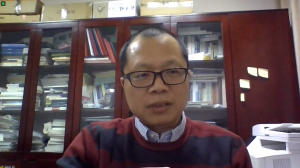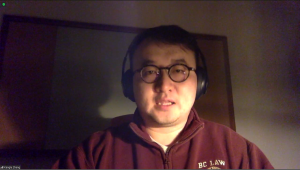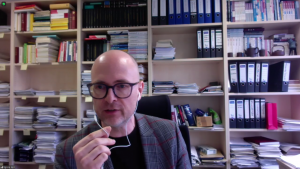
The China Law Week 2020 closed with a session on “Reform and Emerging issues in Chinese Private Law and the Court System”. It was chaired by Jukka Mähönen, Professor of Cooperative Law at the University of Helsinki and Professor of Law at the University of Oslo.

In the first presentation, Professor Jin Haijun from Renmin University gave a brief insight into the Chinese newly made civil law codification. The new Chinese Civil Code was adopted in May 2020 and will be effective from the beginning of next year. Even though the Civil Code is new, Professor Haijun emphasized that most parts of its legislation are not new. For instance, already existing corporative law was basically incorporated in the new civil code. According to Professor Haijun, intellectual property rules were a hot topic during the drafting of the code. Professor Juha Karhu from the University of Lapland commented on the presentation by mentioning for example the way that the code was built putting together different pieces.

Professor Karhu then proceeded with his presentation on the Nordic perspective on the new Chinese Civil Code. Some civil codes of the modern time were discussed, and their economic, political, and cultural background were explored to see why and how the codes were born. The presenter talked about the French Civil Code, the German “Bürgerliches Gesetzbuch”, the situation in the US, and the Chinese Civil Code 2020. Notably, the Chinese Civil Code is based on the economic rise with the opening-up policy and the socialist market economy. The Code also shows Chinese characteristics. It is inspired by various legal systems, but the systematic nature is based on the endemic questions in China.

The third presentation was given by Dr. Kangle Zhang from Peking University Law School about emerging issues in Chinese finance & business law. In Dr. Zhang’s opinion, China is moving towards financial liberalization. There is a trend of providing necessary capital and offering the customers better returns than bank deposits. The establishment of Shanghai pilot free trade zone helps ease legal burden for trading and financial purposes.

The fourth presentation was held by Dr. Wei Qian from the China University of Labour Relations, School of Labour Relations and Human Resources. The pandemic raised a number of issues where the group of disabled elderly people were particularly affected. Local governments in China were fast to enact new policy, and set disabled people, as well as children and elderly people as priority groups that will receive special attention in any big crisis. Dr. Qian talked about how disability policies in China promote the social inclusion of disabled people and how the policies changed under the current Covid-19 situation.

The last presentation of the day and the China Law Week was held by Björn Ahl, Professor and Chair of Chinese Legal Culture at the University of Cologne. He outlined the Chinese court reforms and their impact on decision making. According to Professor Ahl, there has been a contradiction in the reform dynamics between law and the political context within the judicial reform in China. This reform can be seen from a political context where there has been an enhanced dominant party state with violations of human rights. On the other hand, reform of the legal institutions has taken place where judges enjoy more autonomy in decision making to an extent that they never have been.
With 19 chairs and speakers from 7 countries and over 70 participants from 15 countries, the China Law Week 2020 had connected people with interest in Chinese law and legal culture from all over the world. Offering presentations and discussions on a broad spectrum of topics, the event had provided a valuable opportunity to learn more about the latest developments in the world of Chinese law.
The Finnish China Law Center would like to thanks the chairs, speakers, and participants conference for having made the China Law Week 2020 a resounding success. We hope to see you again in the Nordic China Law Week 2021!
The Center would like to thank our interns, Elias Jakala, Anwar Al-Hamidi, Anqi Xiang, Annette Rapo, and Johanna Fähnrich for contributing text for this article.
